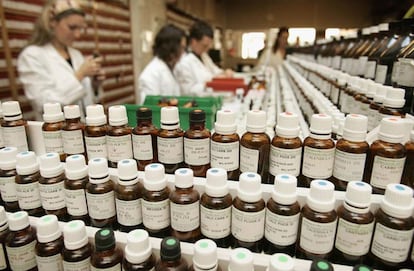Spain moves to ban pseudo-therapies from universities and health centers
Government says they “negatively affect health by perpetuating illnesses, causing others, or even increasing the risk of death”

The Socialist Party (PSOE) government of Prime Minister Pedro Sánchez has put forward a plan to fight the rise of pseudo-therapies such as homeopathy, which promise to have a positive health impact but have no scientific evidence to support their claims. The proposal, unprecedented in the European Union, aims to eliminate so-called alternative therapies from health centers and universities.
The plan comes two months after 400 Spanish scientists signed an open letter calling for action against pseudo-science
“Public and private establishments that include pseudo-therapies will not be able to call themselves health centers,” explained Health Minister Maria Luisa Carcedo, who presented the plan together with Science Minister Pedro Duque.
“Their presence in these spaces gives the idea that they have a therapeutic use. The first thing we have to make clear is that they do not. And if they do not, it makes no sense for them to be there,” said Carcedo, adding that she will show the first draft of the project to regional governments on Thursday.
The government considers that, besides not working, pseudo-therapies “negatively affect health by perpetuating illnesses, causing others or even increasing the risk of death.” According to the government, they do this by “encouraging a person to substitute or delay taking conventional medicine of proven safety and effectiveness,” which “reduces the effectiveness of these (conventional) treatments.”
The project, named Health Protection Plan Against Pseudo-therapies, is divided into four main lines of action. The first is a communication strategy to “generate and spread information based on knowledge and scientific evidence” by subjecting alternative therapies to the same level of scrutiny as scientific fields, and publishing results on their effectiveness.
Public and private establishments that include pseudo-therapies will not be able to call themselves health centers Health Minister Maria Luisa Carcedo
The second part aims to stop “misleading publicity” about pseudo-therapies. To do this, the government will need to modify legislation so that patients must be told that alternative therapies are not effective when they are offered them in private health centers. This measure will also allow the government to stop publicity that promotes alternative therapy services, products, events or anything else relating to pseudo-therapies.
The third part seeks to “eliminate pseudo-therapies from health centers” and “guarantee” that only health professionals with “officially recognized qualification” work there, while the fourth aims to remove any degree that includes pseudo-therapies from the country’s universities. A report will be drafted to clarify which “practices and methods” are not backed by scientific evidence, and this will be used to filter out academic degrees that don’t meet the criteria.
The government says the document is open to suggestions from all relevant sectors, including regional governments, university professors, scientific communities and associations. The plan comes two months after 400 Spanish scientists signed an open letter calling for action against pseudo-science following the death of a cancer patient who refused traditional medicine.
English version by Melissa Kitson.
Tu suscripción se está usando en otro dispositivo
¿Quieres añadir otro usuario a tu suscripción?
Si continúas leyendo en este dispositivo, no se podrá leer en el otro.
FlechaTu suscripción se está usando en otro dispositivo y solo puedes acceder a EL PAÍS desde un dispositivo a la vez.
Si quieres compartir tu cuenta, cambia tu suscripción a la modalidad Premium, así podrás añadir otro usuario. Cada uno accederá con su propia cuenta de email, lo que os permitirá personalizar vuestra experiencia en EL PAÍS.
¿Tienes una suscripción de empresa? Accede aquí para contratar más cuentas.
En el caso de no saber quién está usando tu cuenta, te recomendamos cambiar tu contraseña aquí.
Si decides continuar compartiendo tu cuenta, este mensaje se mostrará en tu dispositivo y en el de la otra persona que está usando tu cuenta de forma indefinida, afectando a tu experiencia de lectura. Puedes consultar aquí los términos y condiciones de la suscripción digital.









































